This post may contain affiliate links.
With our motorhome being a 2012 model on a 2011 chassis, our RV tires were right around the five (5) year old mark in July 2016. And while they still had plenty of tread left on them, they were starting to ‘age out’. A few months earlier, we were getting ready to pull out of our campground in Nashville. We discovered a leaking valve stem on the front passenger tire and called Roadside Assistance for a quick fix. It wasn’t anything serious and ended up being easily fixed. But while there, the tech commented on some tire sidewall cracking and scrub marks that we were already aware of.
We had planned to replace our tires in the coming months and asked for his advice. He pointed out that while our current Michelin tires came standard on virtually every gas powered class A motorhome, he felt there were other tires that were better suited for the job and shared his recommendation. He confirmed our tire replacement was not urgent. But his diagnosis definitely ramped up the schedule in our minds.
We planned to be settled in Colorado for at least a month in July 2016. So we decided to do some additional research and make the change once we arrived back in our old home state. Knowing that tires are such an important part of RV safety, we anticipated we would need to invest a few thousand dollars replacing them. We figured the time spent on the extra research so we could be confident we were making a good decision would be well worth it.
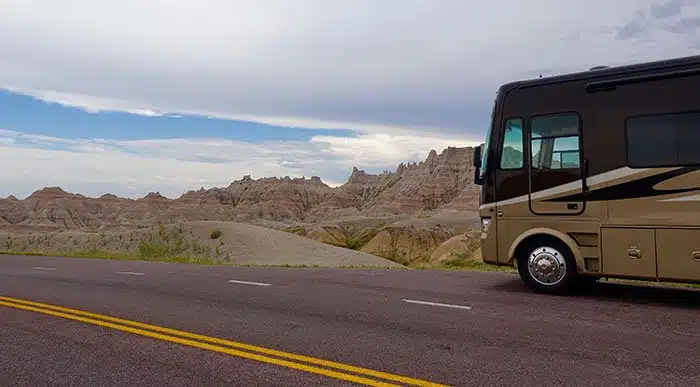
Why RV Tire Age Is So Important
RV tires have a different life than our regular passenger cars. They are driven less frequently and at higher weight loads. Cars and trucks are usually driven many more miles per year. So they usually wear out their tread long before they get old enough for the rubber to degrade.
Because RV tires rarely see the kind of mileage of cars and trucks, they usually ‘age out’ before they run out of tread. That’s where our RV tires were at. We had bought our RV in May 2014 with 23,000 miles on the odometer. Since then, we had put about the same amount of miles on them. So the tires had about 46,000 miles on them at the 5-year mark.
Some people will push the age of their tires out to 7 or even up 10 years. But as the third owners of our RV, we did not know the entire history of our motorhome’s tires. And we were not comfortable with pushing the age limits any further, especially as we were already seeing some sidewall cracking. As full-time RVers, our entire life and home are riding on our tires. It just isn’t something we were willing to push out further and take the risk, just to save a few bucks.
How To Know The Age Of Your Tires
You can find out the age of your tires by inspecting the sidewall and looking a four-digit code. The code will be in a bubble that looks like the example in the photo below. These four numbers represent the week and year that the tires were manufactured. For example, you can see from the code 4615 on our new tires (below), that they were manufactured during the 46th week of 2015.
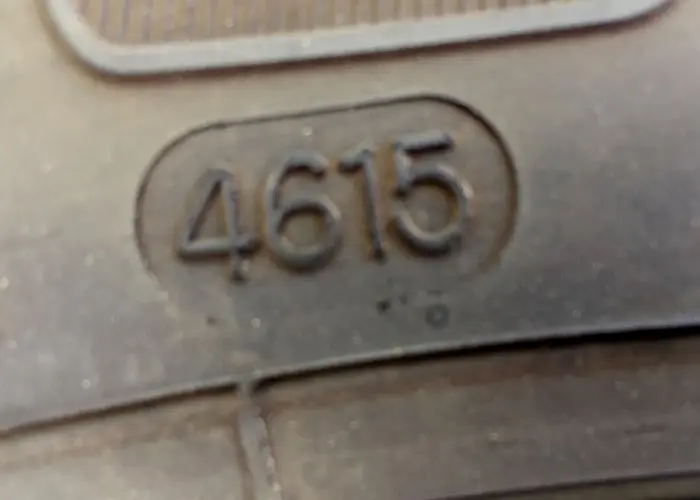
Our Tire Research and What We Chose
We took on board the recommendation of the tech we met in Nashville, did independent research online and also sought the advice of a few tire professionals, in our search for potential replacement tires. We had been reasonably happy with the original Michelin tires. But decided we wanted a stronger sidewall and more durable construction for our next set. We were going to be spending thousands of dollars replacing them. So we may as well be certain we were buying tires that we felt were the best fit for our needs. We just needed to be sure that the tire size and weight capacity were appropriate for our motorhome.
Most people will generally replace their tires with the same size. But we chose to modify the size slightly. We chose a slightly wider tire with a shorter sidewall. The rolling diameter was virtually identical but would offer improved handling and durability characteristics. This allowed a larger contact surface and less flex.
We also chose a tire with a much stronger sidewall built for heavier use. The Bridgestone Ecopia tires we chose are actually commercial tires instead of regular RV tires. As we said, we never had an issue with our Michelins, and we know many RVers swear by them. So we’re not suggesting they’re not up to the task. But the Nashville roadside assistance tire guy specifically recommended the Bridgestone Ecopia tires for our motorhome and when all of our subsequent research confirmed this would be a good choice for our needs, our decision was made. Bridgestone it is!
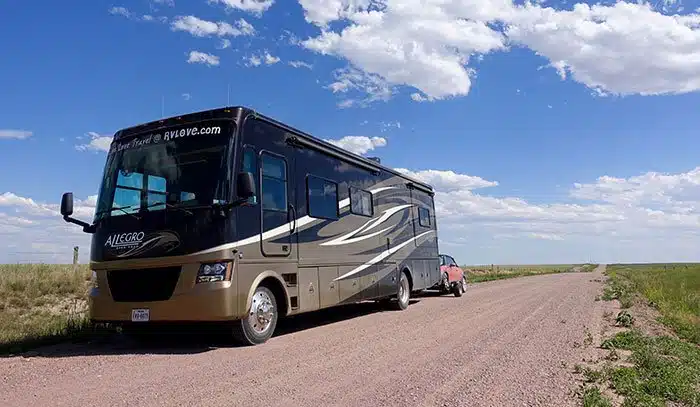
Specifications on our Original vs New Tires
Original Tires: Michelin XR-V 80 R225, Weight: 78 pounds each
New Tires: Bridgestone R268 Ecopia 245 75 R225, Weight: 93 pounds each
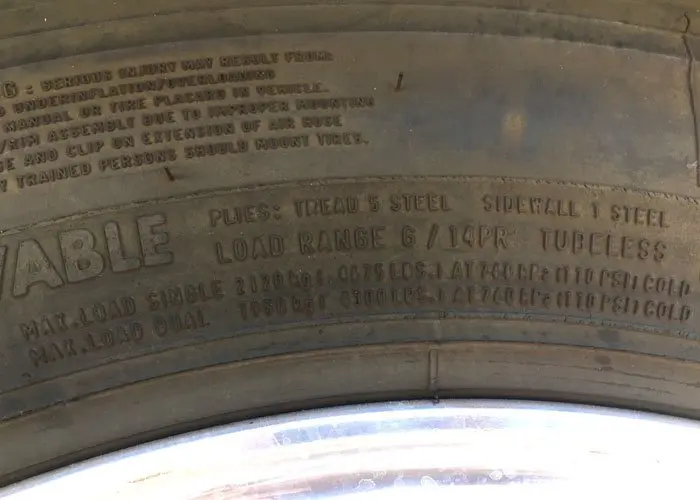
How Have They Performed
We made our new RV tire purchase in July 2016, so about a year and a half ago (as at the time of publishing this blog post and related video). So far, we’ve put about 11,000 miles on them without a single issue. Of course, I continue to take excellent care of our tires.
We keep them covered when we’re parked to keep them protected from the elements (like UV and rain). I am also diligent about checking the tire pressure before driving, keeping them at around 90-100PSI. Overall, we have been extremely happy with these tires and I personally believe they provide better handling and are much more durable tire than the original Michelins that came stock on our coach.
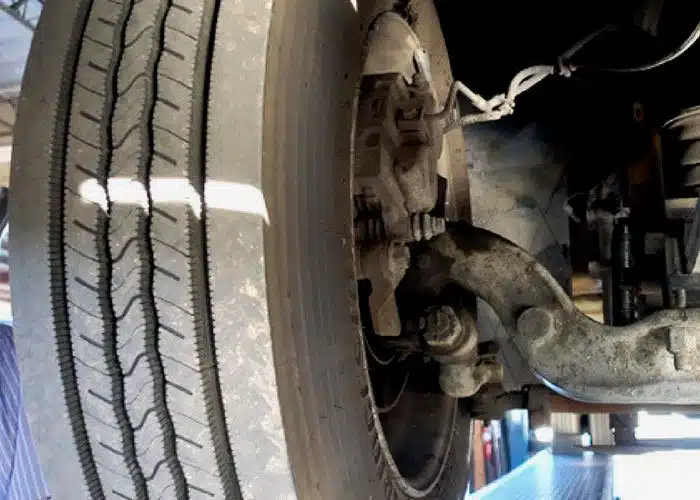
What did our 6 new RV Tires cost?
All up, we paid around $3,200 installed and out the door. That included disposal of our old tires and Colorado state sales tax. And while that may seem high (and it is) remember that replacing tires on travel trailers and other towable RVs will be substantially less expensive. Tires for lighter weight motorized RVs will be less expensive too. But if you’re replacing a set of tires on say, a diesel pusher motorhome, especially one with 3 axles (tag) it could cost as much as $8,000 for a full set of tires.
You will likely need to do a bit more research and planning when buying tires for your RV than you would for your regular car or truck. Most tire shops don’t have the proper equipment or skill to change large tires like these. You’ll need to go to tire shops that are familiar with working on large heavyweight vehicles. And they may need to special order your tires in, which could take a few days or more than a week.
How to Save when Replacing RV Tires
There are many tire discount programs available through various memberships like FMCA, RV Owner’s Clubs (eg. Tiffin has a program) and even Thousand Trails camping memberships. We didn’t realize all of these until after our purchase, so a valuable lesson was learned. Do your homework in advance!
The money you save on new tires can often easily save you more than the cost of a membership (sometimes several hundred dollars on a set). So do take a look at the benefits of any memberships you may already have and/or consider joining one before making your final purchase. In our research, our FMCA membership would have definitely saved us money had we chosen Michelin Tires. But we liked the Bridgestones so much more that we were willing to pay the extra to get exactly what we wanted.
Sidenote: We have since heard that it may be possible to get a discount on Bridgestone tires as well through Michelin dealers that are part of the Michelin Advantage Program, but we have not verified this yet. FMCA has a “Continental Choice” tire program so be sure to shop around.
Our RV Maintenance Costs
Ultimately, we paid the price for peace of mind with regard to our RV tires and we don’t regret it. Now we know the entire history of the tires on our motorhome and feel very confident these tires would easily last 7 years or even more, based on how diligently I take care of them. Tires are not inexpensive to replace, which is why it really pays (literally) to put the time and effort into caring for them properly to keep them lasting longer AND above all, to keep you safe out there on the road.
Want to know what it costs to live and travel full-time in our RV? Check out our financial snapshots where you can compare our 2015 expenses and our 2016 expenses here as this includes our tire purchase.
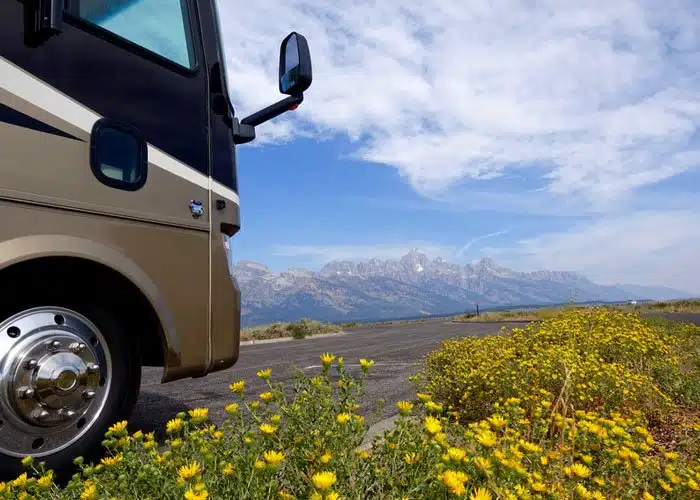
A Few Final Tire Tips
- Tire inflation pressure is very important and even moreso when you have sets of dual tires because they must be the same pressure as the other in the pair otherwise significant wear can occur and increase the risk of tire failure.
- When purchasing new tires, make sure you check pressures after installation and before driving off. It’s too easy to assume the tire shop knows what the ideal pressure should be for your vehicle weight. It is recommended you know the optimal tire pressure for your RV tires before even making your purchase. Consider that as part of your shopping decision-making process.
- The other reason to check your tires before leaving is to make sure the valve stems are re-installed in a way that you can easily check them with your tire pressure gauge. As you’ll see in the video, ours were not in the proper position to do so. I had to have them fix it before driving off.
Tire Gear We Recommend
Valve Core Torque (Tightening) Tool – an inexpensive, must-have in your toolkit. This is the tool that fixed our leaking valve stem problem in just a few seconds and will help us avoid future Roadside Assistance callouts should this happen again.
Inflate Through Valve Caps – these make checking/adjusting your tire pressure much faster and easier, well worth the nominal cost.
Tire Pressure Gauge – if you don’t have a tire pressure monitoring system (TPMS) you’ll need to frequently check your tire pressure with this and adjust as needed. This is the one we use.
Viair RV Automatic Portable Compressor Kit – an excellent compressor for quickly and easily inflating your RV tires.
RV Tire Pressure Monitoring System – tire pressure monitoring system (we currently don’t have this but having done our research, this is on our Wish List). Update.. now we have one. Learn more on our review page
Tire Covers – These are the tire covers we use to protect our RV tires from the elements as we liked how they coordinate with our RV color. We bought the 36-39″ size but be sure to measure your tires to select the right size for your RV. Update, now we have a set from the folks at MagneShade and love them.
Sign up for our email newsletter with the latest RV park reviews, news and updates.
GOT COMMENTS OR QUESTIONS?
We would love to hear from you. Drop us a note in the comments section below.
More RV Maintenance and Repair Content
Want to check out more RV repair and maintenance content? Hover over the images below to see the the title and article name.
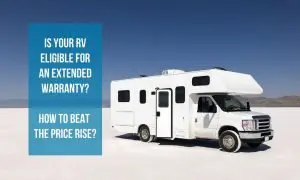
When to Buy an RV Warranty For Best Value
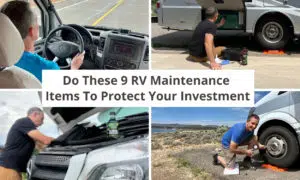
9 RV Maintenance Items To Protect Your Investment
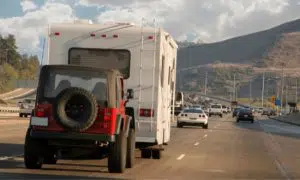
The State of RV Repairs: Problems, Solutions and On-Demand RV Techs
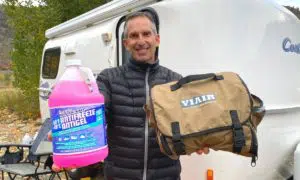
How To Winterize An RV: What You Need

Jeep Death Wobble Fix Update – How We Fixed It

11 More RV Repairs, Mods and Upgrades To Our Motorhome
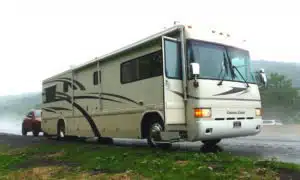
Something is Wrong! Our Death Wobble “Breakdown”

Getting a Professional RV Inspection Before Buying
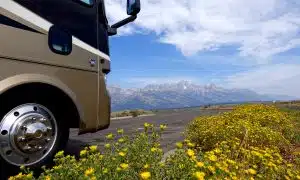
Replacing Our RV Tires for Improved Safety and Performance
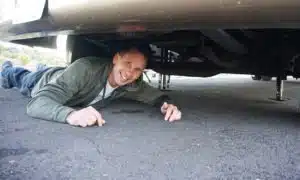
RV Breakdowns: Q&A + 10 Tips for How to Deal with Them
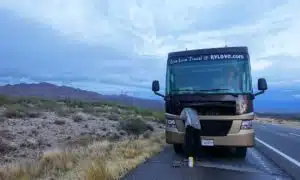
Part 2: 3 RV Breakdowns in a Month
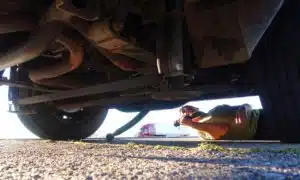
Part 1: 3 RV Breakdowns in a Month

2 Years of RV Repairs & Service Costs


32 thoughts on “Replacing Our RV Tires for Improved Safety and Performance”
Replacing what otherwise appear from your description to be perfectly safe tires is a waste of money in my opinion. Where did you get the 5 year recommendation? On their website, Michelin recommends tires be regularly inspected and replaced between 7 and 10 years. I know “peace of mind” is a factor to be considered, but in my years of RV’ing I’ve had 2 blowouts. Both tires were less than 4 years old. Mechanical failures happen. It’s inevitable when pursuing our nomadic lifestyle. RV’ing is an expensive pursuit under the best circumstances.
It’s your money and your peace of mind factor and you have to do what’s right for you. Personally, I will not throw good money after bad replacing good tires at 5 years.
Agreed that tires often just need to be inspected after 5 years, and replaced between 7-10. And if I was the only owner of the tires and knew the full history, I would have been more comfortable pushing the timeline a bit more than I did. But as mentioned in the blog post and video I had quite a bit of cracking on these tires and they had other markings indicating that they had been ‘curbed’ a number of times, and some uneven wear. I did not replace them solely on age. Just calling extra attention to age as most people who only have experience with cars likely never even consider age as a factor in tire replacement.
Just curious…was your gas mileage affected going from the Michelin XRV tires to the heavier, wider, and I guess shorter Bridgestone tires?
Hi Howard, any change in gas mileage was really indistinguishable to us. So many other factors, ching from towing the MINI to the Jeep was more noticeable, losing about 0.5 mpg. We never get too worried about our gas mileage – it’s always right around 7 – give or take – and is impacted by wind, grade etc… keeping under 60mph is our best friend when it comes to fuel economy. Oh and by the way, of our YouTube subscribers did a calculation and found the difference in tire rotations and speed reading is also negligible less than 1mph (think more like 0.5mph) Hope that helps.
Purchasing a 2013 Winnebago Icasta it has original 22.5 Michelin tires. Should I get Dealer to replace them before we agree to purchase MH ?
They have 43,500 miles on them. I’m concerned.
HI Carol. YES. The miles are less of a concern than the age of the tires. As a 2013 model, it’s likely the tires are dated 2012 which makes them close to 8 years old – you can check the exact date code on the tires. We would definitely ask the dealer to put new tires on the MH before you buy it – and check the batteries too. May as well as for both, and see how you go! If they don’t or won’t, use it as a negotiating tool for a better price. And consider getting a professional inspection before you buy. Here’s our post about that https://rvlove.com/2018/09/29/getting-a-professional-rv-inspection-before-buying-plus-our-fix-it-list/
great video, michelin is my tire of choice, if you go to 5 different tire dealers you could get 5 different recommendations, i have never been disappointed by michelins and i travel many months far from home so i can’t afford to be disappointed
Yes Michelins also a very good tire – absolutely nothing against them whatsoever. This decision was very particular to this coach and needs – we really wanted something heavier duty to help offset the fact our RV weight is very close to the max on our 22K chassis, doing every little thing we can to increase our safety with that in mind. We aren’t attached to any particular brand, it was more the suitable tire construction and stronger sidewall that was better for our needs – and what was available size wise for our coach. We are still fans of Michelin – and wouldn’t have any concerns buying them in the future on a different coach / chassis that overrrides our focus on helping carry our RV weight, our chassis has no extra to spare. Bridgestone just offered a heavier duty alternative for the size.
Do you have any opinion or info on RV Hankook tires?
Excellent read Marc,
Will keep this handy and might pick your brain in a couple years. I know you do good research so we will most likely follow suit.
Thanks Denny, yes reach out anytime. Michelins are still good tires, we just wanted something a bit beefier to help offset our 22K chassis and weight – yours has more CCC than ours. Just being as safe as we can. Also there are probably some tire discount programs around that may discount – these things always changing as you know, so when the times comes, give yourself a good amount of time to look/make decisions, it takes a little planning. Hope you guys are doing great!
Just curious…was your gas mileage affected going from the Michelin XRV tires to the heavier, wider, and I guess shorter Bridgestone tires?
Hi Howard, any change in gas mileage was really indistinguishable to us. So many other factors, ching from towing the MINI to the Jeep was more noticeable, losing about 0.5 mpg. We never get too worried about our gas mileage – it’s always right around 7 – give or take – and is impacted by wind, grade etc… keeping under 60mph is our best friend when it comes to fuel economy. Oh and by the way, of our YouTube subscribers did a calculation and found the difference in tire rotations and speed reading is also negligible less than 1mph (think more like 0.5mph) Hope that helps.
great video, michelin is my tire of choice, if you go to 5 different tire dealers you could get 5 different recommendations, i have never been disappointed by michelins and i travel many months far from home so i can’t afford to be disappointed
Yes Michelins also a very good tire – absolutely nothing against them whatsoever. This decision was very particular to this coach and needs – we really wanted something heavier duty to help offset the fact our RV weight is very close to the max on our 22K chassis, doing every little thing we can to increase our safety with that in mind. We aren’t attached to any particular brand, it was more the suitable tire construction and stronger sidewall that was better for our needs – and what was available size wise for our coach. We are still fans of Michelin – and wouldn’t have any concerns buying them in the future on a different coach / chassis that overrrides our focus on helping carry our RV weight, our chassis has no extra to spare. Bridgestone just offered a heavier duty alternative for the size.
Where in heck are you buying tires! I replaced the all 6 on my pusher for $1700!
All in the article. I guess the question is really.. what tires did YOU buy and from where – brand, shop, date code etc.. are they from China? While we love to save money, buying new tires is not a decision we make lightly. Safety is priority 1 and we want high quality tires that are fresh, same age, size… you can find cheaper ones around but we weren’t willing to “pay the price” of potential risks that come with that. Our home and lives are riding on them. We would never buy new tires for our RV based solely on the cheapest price around. EVER. But if you have some kind of ‘secret’ that we don’t know about, feel free to share.
Good article, few people even think about their tires and they really are important I been using Michelin for 40 years and never had a problem. It’s doubtful I would ever change brands when I have received such good performance!
Absolutely Larry! tires are SO important. And if your tires continue to perform well for your needs, there is no real need to change. This decision was not brand specific so much as better-tires-for-our needs specific. We are very happy with the extra robustness of our Bridgestones as our coach is right up to weight limits, so needed something heavier duty to offset. If that wasn’t an issue, we would certainly consider Michelins as well next time. All the best to you!
Good article, few people even think about their tires and they really are important I been using Michelin for 40 years and never had a problem. It’s doubtful I would ever change brands when I have received such good performance!
Absolutely Larry! tires are SO important. And if your tires continue to perform well for your needs, there is no real need to change. This decision was not brand specific so much as better-tires-for-our needs specific. We are very happy with the extra robustness of our Bridgestones as our coach is right up to weight limits, so needed something heavier duty to offset. If that wasn’t an issue, we would certainly consider Michelins as well next time. All the best to you!
I have a lot of people twisting my arm to get a tPMS. I think I will make the purchase some time soon before I am sorry I didn’t make that purchase.
I was wondering, with you being a former policeman, what would have been your response had you been on duty and come up on a husband and wife sitting in the middle of the road back to back with the double yellow no passing zone lines running between them? I doubt you would have said, “Oh, what a nice looking couple. I think I will stop and see if I can get in the picture!” I doubt it. Apparently, no high speed cars came along and endangered you. I am glad for that!!
Haha yes we definitely chose a very quiet street on a weekday with good visibility for capturing that shot. All good. TMPS are an excellent safety feature to have and we do recommend them. They are a wise investment. Cheers!
I have a lot of people twisting my arm to get a tPMS. I think I will make the purchase some time soon before I am sorry I didn’t make that purchase.
I was wondering, with you being a former policeman, what would have been your response had you been on duty and come up on a husband and wife sitting in the middle of the road back to back with the double yellow no passing zone lines running between them? I doubt you would have said, “Oh, what a nice looking couple. I think I will stop and see if I can get in the picture!” I doubt it. Apparently, no high speed cars came along and endangered you. I am glad for that!!
Haha yes we definitely chose a very quiet street on a weekday with good visibility for capturing that shot. All good. TMPS are an excellent safety feature to have and we do recommend them. They are a wise investment. Cheers!
Great information, we use Michelin and within the next 12 months will probably replace them, I never thought about Bridgestone tires, another update on performance after you have driven awhile would be helpful. thanks!!
Hi Ray, this blog post was written 7 months after our purchase with 11,000 miles driven on them, so would consider our report in this blog post to be accurate for your questions. We are not suggesting Michelins aren’t good tires, just that the Bridgestones happened to be a better fit for the needs of our motorhome on 22K chassis with no weight room to spare, we wanted to beef up everything we could to support the motorhome, with these tires and the Sumo springs suspension upgrade as well. We wouldn’t have an issue buying Michelins again in the future – on another coach without our weight limitations. Hope that helps!
Great help ..very informative.. thank you so very much. I have a tiny 19 foot Fun Finder little tires that will need to be changed and your video helped me tremendously to know what to look for and to go into a tire shop with knowledge I appreciate it very very much thank you
Happy trails,
Cathy
Excellent, thanks Cathy!
Great help ..very informative.. thank you so very much. I have a tiny 19 foot Fun Finder little tires that will need to be changed and your video helped me tremendously to know what to look for and to go into a tire shop with knowledge I appreciate it very very much thank you
Happy trails,
Cathy
Excellent, thanks Cathy!